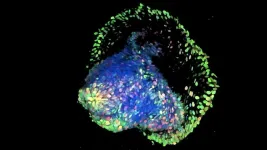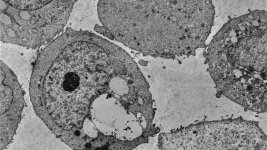(Press-News.org) Researchers from Johns Hopkins Children’s Center say they have identified a gene pathway involving the mineral zinc in mice that may someday point the way to using zinc-based supplements to directly help people with a rare disorder called short bowel syndrome (SBS).
The findings, published Oct. 7 in Nature Communications, help advance efforts toward more effective, potential treatment regimens for both children and adults with the debilitating condition.
SBS, which affects 10,000–20,000 adults and children in the United States, is marked by damage to and shortening of the small intestine. While in rare cases, children can be born with SBS, it is more often a complication of conditions such as necrotizing enterocolitis — a disease that affects the intestines of premature infants.
Children with SBS have a reduced ability to absorb nutrients from the diet, often require intravenous nutritional support, and experience significant complications including malnutrition, dehydration, unintentional weight loss and death. Treatment and management approaches — including special diets, surgical procedures and, occasionally, small bowel transplants, are only partially effective, and often result in side effects including infection and extended hospital stays.
“Short bowel syndrome is a huge problem, and has a great impact on patients who experience this condition and their families,” says David Hackam, surgeon-in-chief and co-director of Johns Hopkins Children’s Center and senior author of the study. Their study was designed, he said, to identify whether there may be new treatment options for patients with this disease. Surprisingly, they identified a previously unrecognized role for zinc, to protect and even grow what bowel remains in people with SBS.
In the first part of their study, researchers used a mouse model with SBS, which exhibited characteristics similar to humans with the disease. Researchers examined what a shortened bowel looks like over time, and discovered that the villi — tiny, hairlike, fingerlike projections in the small intestine that absorb the food and nutrients you eat — started to naturally grow and become longer.
“The villi were adapting — you could say that they were reaching out for more food,” says Hackam. However, according to Hackam, these villi could not fully “catch up” or heal.
Next, the researchers examined how the healing process would work in humans with SBS, and identified possible gene pathways that may help intestines adapt or “speed up” the healing process. To do that, they implanted human-induced stem cells into a mouse, so it would develop humanlike intestines.
The researchers then used single cell RNA sequencing to measure how specific genes are expressed. That enabled them to map multiple gene pathways in the model’s intestines, and examine which genes affected recovery, says Hackam.
After a month of recovery from the implantation of humanlike intestines, researchers studied all of the genes that were either turned on or turned off as the intestines adapted and tried to heal. They discovered that the zinc transport genes known as SLC39A4 and SLC39A5, which are found in the small intestine and are key to transporting zinc in the body, were upregulated, or turned on, and affected the ability of the bowel to recover. Using quantitative polymerase chain reaction (qPCR), a method that measures gene levels by looking at how much RNA is present, researchers found that the levels of these zinc transporter genes in the intestines of the experimental models were up to 4 or 5 times higher than in control subjects.
Next, to assess whether supplementing with zinc could help advance or “speed up” intestinal function and healing, the researchers fed the mice with SBS a liquid, high-zinc diet, (65 milligrams per kilogram per day of zinc acetate). Mice on a high-zinc diet not only gained more weight compared with those on standard or zinc-depleted diets, but they also experienced a partial reversal of the typical effects of SBS. By the end of the first week, mice on the standard liquid, zinc-depleted diet (13.5 milligrams per kilogram per day of zinc acetate) had lost more weight (13.38 ± 1.11%), while those receiving extra zinc had significantly less weight loss (7.1 ± 1.19%). Importantly, the high-zinc diet led to better survival rates, 85.7% compared to 66.67%, and improved the capacity of the intestines to absorb nutrients and fluids due to longer and healthier intestinal villi. “Overall, we found that boosting zinc intake helped the mice recover better and increased their chances of survival,” says Maame Sampah, a research fellow and surgical trainee working with Hackam at Johns Hopkins Children’s Center and a co-author of the study.
To confirm these findings in human tissue samples, researchers examined tissue from 26 people (14 with SBS) who underwent endoscopic or surgical procedures between 2008 and 2020 at Washington University in St Louis. The analysis revealed those with SBS had much higher levels of RNA from the gene SLC39A5, while levels of the other key zinc gene, SLC39A4, were the same in both groups. However, the proteins made by these genes — the zinc transporter proteins, ZIP4 and ZIP5 — ended up in different locations within the intestinal cells of patients with SBS compared with controls. Researchers say these findings suggest that the intestines of these patients were working overtime to grab as much zinc as possible, and highlight the therapeutic potential of using the supplement as a treatment for SBS management.
Researchers caution that further studies on animals and in clinical trials must be done to test whether zinc supplements are safe and effective for therapy in people. However, they believe the findings offer an opportunity to better understand short bowel syndrome.
“Our study findings provide a lot of hope for patients and families who are struggling with SBS, says Hackam. “There may be potential new treatment regimens on the horizon that are safe and effective.”
Along with Hackam and Sampah, authors from Johns Hopkins are Hannah Moore, Raheel Ahmad, Johannes Duess, Peng Lu, Carla Lopez, Steve Steinway, Daniel Scheese, Zachariah Raouf, Koichi Tsuboi, Jeffrey Ding, Connor Caputo, Madison McFarland, William Fulton, Sanxia Wang, Meghan Wang, Thomas Prindle, Samuel Alaish and Chhinder Sodhi. Authors from Washington University School of Medicine, St. Louis, are Vered Gazit and Deborah Rubin.
The study was funded by grants from the National Institutes of Health under award numbers R35GM141956 and T32DK007713.
No authors declared conflicts of interest under Johns Hopkins University School of Medicine policies.
END
Johns Hopkins Children’s Center research in mice suggests zinc supplements have potential value to directly treat short bowel syndrome
The researchers identified a key gene pathway involving zinc and showed that the metal found in supplements improves survival and weight gain in mouse models with rare disorder found in adults and children
2024-10-24
ELSE PRESS RELEASES FROM THIS DATE:
Kalinin receives David Adler Lectureship Award
2024-10-24
Sergei Kalinin, a professor in the Department of Materials Science and Engineering, has been named the winner of the David Adler Lectureship Award in the Field of Materials Physics by the American Physical Society. The award recognizes one outstanding contributor in the field of materials physics who is notable for high-quality research, review articles, and lecturing.
“I am deeply honored to receive the Adler Award, as it recognizes the critical transition in materials discovery that my colleagues at the University of Tennessee and Pacific Northwest National Laboratory and I have championed,” ...
Evaluating the link between chemicals and declining insect populations
2024-10-24
Few people are fans of stink bugs, mosquitoes, or boll weevils, but insects play a key role in the circle of life that makes up the planet’s environment. In fact, world-renowned biologist E. O. Wilson famously declared that if insects vanished, our environment would collapse.
Scientists have noted that insect behaviour has been changing, and their populations are declining – on average 2-3% per year. This has prompted them to investigate the potential causes of this change, such as habitat loss due to overdevelopment, climate change, and chemical use.
EMBL researchers and collaborators recently investigated how pesticides, herbicides, ...
Scientists discover molecules that store much of the carbon in space
2024-10-24
A team led by researchers at MIT has discovered that a distant interstellar cloud contains an abundance of pyrene, a type of large, carbon-containing molecule known as a polycyclic aromatic hydrocarbon (PAH).
The discovery of pyrene in this far-off cloud, which is similar to the collection of dust and gas that eventually became our own solar system, suggests that pyrene may have been the source of much of the carbon in our solar system. That hypothesis is also supported by a recent finding that samples returned from the near-Earth asteroid Ryugu contain large quantities of pyrene.
“One of the big questions in ...
Sublethal agrochemical exposure disrupts insect behavior and long-term survivability
2024-10-24
Even at concentrations too low to kill, exposure to widely used agrochemicals – pesticides, herbicides, and fungicides, among others – has pervasive negative impacts on insect behavior and physiology, researchers report. The findings highlight the need for more comprehensive pesticide assessments, focusing not just on lethality but also on unintended long-term ecological harm to safeguard biodiversity. Over the past decade, many reports have highlighted alarming declines in insect ...
Understanding that US wildfires are becoming faster-moving is key to preparedness
2024-10-24
“The modern era of megafires is often defined based on wildfire size,” say Jennifer Balch and colleagues in a new study, “but it should be defined based on how fast fires grow and their consequent societal impacts.” Balch and colleagues report that wildfire growth rates in the U.S. have surged over 250% over the last 2 decades. Although these fast-moving infernos, or “fast fires” – those spreading more than 1,620 hectares in a day – account for only 2.7% of wildfire events from 2001 to 2020, researchers report that they are responsible for 89% of the total structures damaged ...
Model predicts PFAS occurrence in groundwater in the US
2024-10-24
According to a new machine learning-assisted predictive model, as many as 95 million Americans may rely on groundwater containing PFAS for their drinking water supplies before any treatment, researchers report. This raises concerns about unmonitored contamination in domestic and public water supplies. Per- and polyfluoroalkyl substances (PFAS), often called “forever chemicals,“ are highly persistent environmental contaminants linked to adverse environmental and health effects. Used in many consumer products, these organic pollutants have become ubiquitous in the environment and ...
By studying new species of tardigrade, researchers glean insights into radiation tolerance
2024-10-24
Tardigrades, eight-legged microorganisms colloquially known as “water bears,” are the most radiation-tolerant animals on Earth. Now, by studying a newly identified species of tardigrade, researchers have gleaned valuable insights into the animal’s ability to withstand radiation. These findings hold implications for safeguarding human health in extreme environments, such as spaceflight. Roughly 1,500 species of tardigrades have been described. These creatures can endure gamma radiation ...
Plastic chemical causes causes DNA breakage and chromosome defects in sex cells
2024-10-24
A new study conducted in roundworms finds that a common plastic ingredient causes breaks in DNA strands, resulting in egg cells with the wrong number of chromosomes. Monica Colaiácovo of Harvard Medical School led the study, which was published October 24 in the journal PLOS Genetics.
Benzyl butyl phthalate (BBP) is a chemical that makes plastic more flexible and durable, and is found in many consumer products, including food packaging, personal care products and children’s toys. Previous studies have shown that BBP interferes with ...
Vitamin K supplement slows prostate cancer in mice
2024-10-24
Prostate cancer is a quiet killer. In most men, it’s treatable. However, in some cases, it resists all known therapies and turns extremely deadly. A new discovery at Cold Spring Harbor Laboratory (CSHL) points to a potentially groundbreaking solution. CSHL Professor Lloyd Trotman’s lab has found that the pro-oxidant supplement menadione slows prostate cancer progression in mice. The supplement is a precursor to vitamin K, commonly found in leafy greens. The story begins more than two decades ago.
In 2001, the National Cancer Institute’s SELECT trial sought to determine if an antioxidant ...
Wildfires are becoming faster and more dangerous in the Western U.S.
2024-10-24
Fast-growing fires were responsible for nearly 90 percent of fire-related damages despite being relatively rare in the United States between 2001-2020, according to a new study led by the University of Colorado Boulder. “Fast fires,” which thrust embers into the air ahead of rapidly advancing flames, can ignite homes before emergency responders are able to intervene. The work, published today in Science, shows these fires are getting faster in the Western U.S., increasing the risk for millions of people.
The research highlights a critical gap in hazard preparedness across the U.S. — National-level ...
LAST 30 PRESS RELEASES:
Power in motion: transforming energy harvesting with gyroscopes
Ketamine high NOT related to treatment success for people with alcohol problems, study finds
1 in 6 Medicare beneficiaries depend on telehealth for key medical care
Maps can encourage home radon testing in the right settings
Exploring the link between hearing loss and cognitive decline
Machine learning tool can predict serious transplant complications months earlier
Prevalence of over-the-counter and prescription medication use in the US
US child mental health care need, unmet needs, and difficulty accessing services
Incidental rotator cuff abnormalities on magnetic resonance imaging
Sensing local fibers in pancreatic tumors, cancer cells ‘choose’ to either grow or tolerate treatment
Barriers to mental health care leave many children behind, new data cautions
Cancer and inflammation: immunologic interplay, translational advances, and clinical strategies
Bioactive polyphenolic compounds and in vitro anti-degenerative property-based pharmacological propensities of some promising germplasms of Amaranthus hypochondriacus L.
AI-powered companionship: PolyU interfaculty scholar harnesses music and empathetic speech in robots to combat loneliness
Antarctica sits above Earth’s strongest “gravity hole.” Now we know how it got that way
Haircare products made with botanicals protects strands, adds shine
Enhanced pulmonary nodule detection and classification using artificial intelligence on LIDC-IDRI data
Using NBA, study finds that pay differences among top performers can erode cooperation
Korea University, Stanford University, and IESGA launch Water Sustainability Index to combat ESG greenwashing
Molecular glue discovery: large scale instead of lucky strike
Insulin resistance predictor highlights cancer connection
Explaining next-generation solar cells
Slippery ions create a smoother path to blue energy
Magnetic resonance imaging opens the door to better treatments for underdiagnosed atypical Parkinsonisms
National poll finds gaps in community preparedness for teen cardiac emergencies
One strategy to block both drug-resistant bacteria and influenza: new broad-spectrum infection prevention approach validated
Survey: 3 in 4 skip physical therapy homework, stunting progress
College students who spend hours on social media are more likely to be lonely – national US study
Evidence behind intermittent fasting for weight loss fails to match hype
How AI tools like DeepSeek are transforming emotional and mental health care of Chinese youth
[Press-News.org] Johns Hopkins Children’s Center research in mice suggests zinc supplements have potential value to directly treat short bowel syndromeThe researchers identified a key gene pathway involving zinc and showed that the metal found in supplements improves survival and weight gain in mouse models with rare disorder found in adults and children




